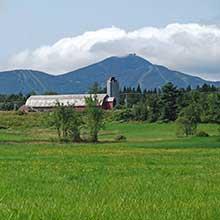Posted July 6, 2016 at 08:11am by Sophia Veltrop
Farmland Conserved and Water Quality Protected in Newport and Troy

Two family dairies—one large and one small—worked with the Vermont Land Trust to conserve farmland in Newport and Troy. In both cases, selling conservation restrictions helped to offset the expense of recently purchased farmland. The projects were funded in part through a new federal program aimed at protecting the Lake Champlain watershed.
Farmers Marc and Tiffany Marquis milk 70 cows on their organic farm on Route 100 in Newport Center (pictured on the right). Marc bought the home farm from his uncle in 2011. With the intense competition for good farmland, Marc and Tiffany were excited to have the opportunity to purchase a 124-acre hayfield directly across the street from their main farm. They immediately began to look into selling a conservation easement as a way to make the purchase more affordable.
“We lease a good amount of land for haying and some of it is pretty far away,” said Marc Marquis. “When the opportunity to purchase a piece of land across from our farm came up, we were thrilled that our farm could finally have enough land to be viable on its own. Being able to sell the development rights to the Vermont Land Trust helped make this possible for our family business.”
Several miles northwest, another large stretch of cropland was recently protected through conservation. Brothers Reg and Mike Chaput of Chaput Family Farms bought and then conserved a 208-acre parcel on Route 105 (pictured below, left). An innovative operation, the 1,700-head dairy farm installed a 300-kilowatt methane digester in 2010—the first to go online through Vermont’s Standard Offer Program. Reg and Mike are also strong conservation supporters, having protected more than 1,000 acres with the Vermont Land Trust.

“Though the financial aspect of selling the development rights was a driving factor in our decision, there was also a great deal of satisfaction in knowing that this property would be dedicated to the purpose of dairy farming in perpetuity,” remarked Reg Chaput. “Vermont is a state of real natural beauty and we believe that future generations will appreciate the efforts we are making to keep it that way.”
Funding to support these projects came from state and federal sources. The Vermont Housing & Conservation Board provided grant support that was matched by a special USDA Natural Resources Conservation Service (NRCS) grant to the Vermont Department of Environmental Conservation.
“These projects are public investments in the future of our rural communities,” said Ethan Parke, a conservation analyst with the Vermont Housing & Conservation Board. “With good soils and many active farms in the area, it would be a shame to see land like this be developed. Conserved land, sound farming practices, healthy crops—these are the things that breathe life into our small towns.”
The $16 million grant to the State through the NRCS Regional Conservation Partnership Program (RCPP) was the second largest in the country and will help landowners in the Lake Champlain Basin of Vermont and New York invest in best management and conservation practices to help improve water quality.
“RCPP will help conserve important and environmentally critical agricultural lands in Vermont, and will help restore and protect wetlands that absorb runoff and slow floodwaters,” explained NRCS State Conservationist Vicky Drew.
Both of the recently conserved parcels lie in Lake Champlain’s Upper Missisquoi watershed and contain significant aquatic features. The Marquis conservation easement includes 14 acres of special restrictions along two tributaries of Mud Creek, and the Chaput easement includes 19 acres of restrictions for a small wetland and more than three miles of frontage on tributaries of the Missisquoi River’s Jay Branch.
“These projects are exciting examples of how greater collaboration can benefit farming and water quality,” explains Kari Dolan, the Department of Environmental Conservation's Clean Water Initiative Program Manager. “Everyone wins—farmers and the public alike.”
During the past four decades the Vermont Land Trust has conserved around 900 farms and farmland parcels around the state. The permanent conservation easements placed on these properties ensure that the land will always be available for farming. The farms can still be privately owned, and farmers continue to manage and pay taxes on the land. In addition to protecting water quality, both the Chaput and Marquis conservation easements have provisions that ensure the future affordability of the land to working farmers.
“Farmland conservation doesn’t just ensure that productive land remains in agricultural use,” said Britt Haselton, farm project director for the Vermont Land Trust. “It also helps protect water quality and aquatic habitat in Vermont’s watersheds.”
